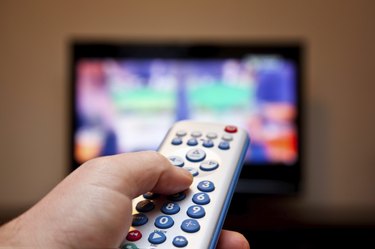
HDTVs may not have as many viewing issues as older analog TVs, but they still require a clear signal from the broadcast source to the TV. If anything blocks or interferes with that signal, the HDTVs picture can stutter or become pixelated. The cause of a bad signal depends on the source and it is usually simple to fix.
Broadcast TV With an Antenna
Video of the Day
When an HDTV stutters or pixelates while watching broadcast antenna-only stations, the cause is most likely signal weakness or interference. Decades ago, houses often experienced electrical conflicts if too many appliances on the same circuit were used at once. This meant that every time someone used a vacuum cleaner, the television display would appear snowy or lined. With HDTVs, you probably won't experience circuit conflicts, but you may have airwave interference. Microwave ovens, for example, can cause freezing or stuttering on a nearby HDTV. Hand-held radios or anything else that uses airwaves to transmit a signal can interfere with your TV reception.
Video of the Day
Do you have an amplifier on your antenna? Most people who live inside, or within 20 miles, of a major city do not need an amplifier. Using an antenna amplifier in a high population area can actually hinder your antenna's performance, because it picks up and amplifies interference.
Another thing to check is the position of your antenna. An indoor/outdoor antenna should be placed either in an attic or on the roof of your house. It should be placed away from metal objects, satellite dishes and other antennas. Turning your antenna toward the nearest broadcast tower should also improve your signal. If you have an indoor antenna attached directly to the TV, make sure it is not sitting next to another electronic device.
Satellite TV
You may also experience stuttering from satellite TV. The first thing to check is your coax cable. If it is old and worn, your signal problem might be solved by replacing it. Weather is another cause of HDTV stuttering. You may notice that your signal deteriorates only during high winds or rain. This is common with satellite TV, but there are a few things you can try to improve the situation. First, make sure your satellite dish is peaked for optimal reception. This means that it is facing the right way and on the correct side of the house. If you are not sure if your satellite dish is peaked properly, call your service provider and have someone come out and check.
Cable TV
With cable TV, there is not much you can do on your end to prevent stuttering. Check the quality of your coax cable and check to see if there is any electronic household interference. Since the signal comes from the cable company's satellite and not from on top of your house, you may have to contact your service provider for a solution.
Other Possible Causes
You may notice that your HDTV only stutters when watching TV through a streaming device, DVR or gaming console. This may be caused by a weak Internet signal. If your device is connected to your Internet wirelessly, try connecting it to your router via Ethernet and see if the signal improves. If it does, either use a Wi-Fi signal booster or move the device closer to the router.
It is rare, but possible, that the stuttering comes from a defect in the TV. You can determine this by connecting another TV to your antenna or satellite and see if the stuttering occurs. If other TVs work fine in the same location, contact the manufacturer of the defective TV for a solution.